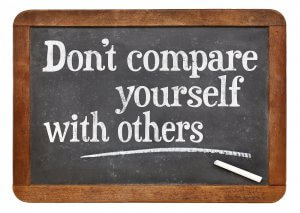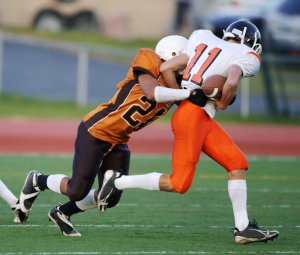In part 1, we discussed potential factors and warning signs for poor body image as an athlete. Now, we will identify helpful tools to promote a healthy body image.
1. Self-talk

On the other hand, utilizing positive self-talk can foster a more productive relationship with yourself. Working on this means compartmentalizing your thoughts and feelings to challenge this overall negative outlook. In other words, dividing things up into smaller categories or “boxes” to deal with them separately. You may not be happy with one part of your body, but that doesn’t have to take away from the parts you can appreciate. When you use positive or neutral self-talk, be specific! Thank your feet for being able to run or dance. Appreciate your muscles for working hard at practice. Be grateful for a good deep breath after an intense workout. Healthy body image does not have to revolve solely around one aspect of appearance, but the sum of its parts and how those parts are serving you.
If you are someone who struggles with coming up with positive self-statements, try scanning a list such as the one below. 50 Positive Self Talk Affirmations for Athletes
2. Challenge Comparisons
As an athlete, it is natural to compare ourselves to someone on our team or someone we may be competing against. However, sometimes comparisons can take over and be our main focus in the field. Hyper Fixating on comparison yourself with others or professional athletes can lead to low motivation, low self-esteem, and not feeling good enough. This is setting ourselves up for failure when it comes to body image. At its core, no two bodies are alike. When we compare ourselves to someone else’s weight, height, muscle tone, and ability, we are setting ourselves up to be hurt by something we cannot control or become. Everyone is different based on their genetic and biological makeup, and their natural abilities, and then comes the practice time and training.
Instead of focusing on others, turn that comparison inward. Use it to motivate you to reach your own goals. For example, maybe we want to break a new personal record during training, focus on a new technique or skill, or increase our practice time. YOU are your own toughest competition.

Personally, I like to do something unrelated to my sport to regain a sense of control, such as cleaning my room for 10 minutes, journaling, or going outside if I can. Those are all things that I am in control of doing! When we take back what is in our control, we continuously learn to accept what is out of our hands and take back power.
3. Goals and Values
The steps above build off of each other, leading to our next step–goal setting! When we can be kinder in our self-talk and focus on ourselves, we can then set goals that are appropriate for just us and our body! Of course we may have team goals, but when it comes to training as an athlete, personal goals are a priority. Take time to reflect on your short-term and long-term goals as an athlete that connect to your self-worth. Focusing on self-worth related goals will then trigger us to reflect on what we value, such as dedication, perseverance, ability, and hard work. These values can be a reminder of how hard your body is working as an athlete. It’s also a reminder to practice gratitude for your body and the work it does.
4. Be On Your Own Team
Hear me out. Tough love is definitely a thing. When it is directed towards ourselves, it can be that much more intense and harsh. The tough love approach is not your friend when it comes to athletic goals or body image. This method puts us down, beats us up, and most definitely does not have you feeling motivated for the next step. Even if we get there, we tend to have a hard time celebrating that achievement. Be on your own team! Cheer for yourself, let yourself know that you did it, and sit in that goodness. A goal is set to be achieved, not to be buried in the sand and forgotten. If that was the plan, we shouldn’t have set it in the first place.

A Teen Counselor in Branchburg or Scotch Plains, NJ Can Support Your Teen Athlete
If your child is an athlete our teen counselors in Scotch Plains and Branchburg, NJ can provide them with extra support when it comes to body image. We know navigating your teenage years can be hard. However, with the right support, it can be extremely rewarding. Online therapy for teens can help from anywhere in New Jersey. Our therapy practice is here to support you and your teen. Start by following these steps.
- Reach out to us to talk with a teen counselor.
- Make your first counseling for teens appointment at Brave Minds Psychological Services.
- Watch your teen thrive.
Other Services We Offer in Scotch Plains, NJ and Branchburg, NJ
Online therapy for teens isn’t the only service that we offer at Brave Minds Psychological Services. For adults, we provide trauma therapy, food allergy therapy, and couples counseling. Additionally, we have postpartum counseling and birth trauma therapy. We offer teen anxiety treatment, social phobia therapy for teens, child sexual abuse therapy, child anxiety treatment, and more. Our services are offered in person at our Scotch Plains, NJ office and through online therapy in New Jersey



